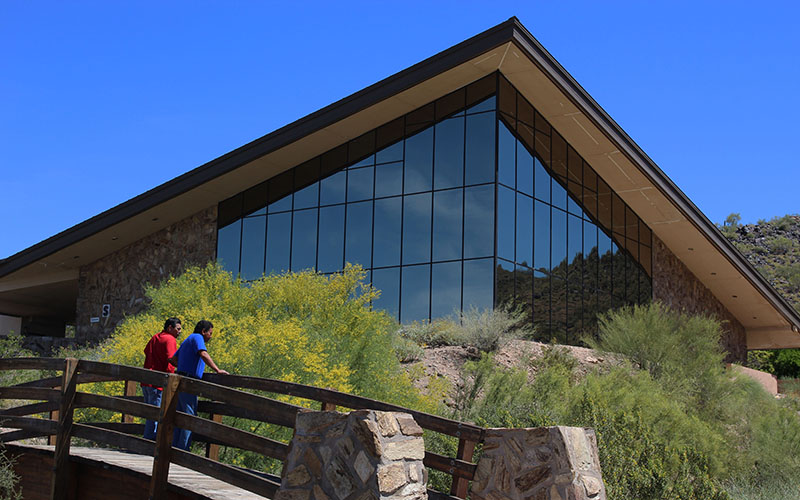WASHINGTON – Immigration raids at houses of worship remain infrequent. But arrests last week at two Los Angeles-area churches have stoked fear among migrants and an uproar among advocates.
Although no reports have surfaced of churches in Arizona being targeted, many were already on edge.
Since the beginning of the year, the Rev. Veronica Alvarez has made sure the doors are locked and monitored at Faith Evangelical Lutheran Church in Phoenix, where about half the congregation is Hispanic.
“In light of the new rules, there is no sanctuary at all,” she said Monday by phone. “It’s a sacred place where you should feel safe. But this administration is taking all that away. So all I can do is try to keep that space sacred for them to feel safe.”
Before President Donald Trump’s return to office in January, Department of Homeland Security policy required Immigration and Customs Enforcement agents to avoid making arrests at churches, hospitals, schools and other “protected areas.”
Trump lifted that policy in January.
In Los Angeles, dozens of ICE raids at car washes and other sites sparked days of protests. That prompted Trump to deploy Marines and the California National Guard, which he federalized over the objection of Gov. Gavin Newsom, a Democrat.
On June 11, ICE agents arrested two migrants outside churches in Downey, a city of about 110,000 people in Los Angeles County.
On a sidewalk outside Our Lady of Perpetual Help Catholic Church, agents arrested an elderly man after he dropped off his granddaughter at school.
At Downey Memorial Christian Church, a group of armed men wearing face masks and bulletproof vests that said “POLICE” detained a Latino man and took him away in an SUV with Texas plates, according to the pastors.
The men wore badges but refused to say what agency they worked for, pastor Alfredo Lopez told KNBC-TV. One drew a rifle on his wife – the senior pastor – when she demanded they get off church property, he said.
“The one that was holding the rifle, he said the whole country is our property. That sent a message,” Lopez said. “Just a community member going about his day. It’s pretty concerning.”
An ICE spokesperson, citing “ongoing litigation,” declined to discuss current policies and restrictions regarding places of worship.
Enforcement actions at churches began soon after Trump returned to office, though they remained sporadic.
In Puerto Rico, agents detained people on their way to the San Pablo Methodist Church in January.
In Georgia, about a week after Trump’s inauguration, ICE officers waited outside a church in the city of Tucker and arrested a Honduran asylum seeker after he attended a service. The man had been wearing an ICE ankle monitor and, according to his wife, had a five-year work permit that should have precluded him from being targeted for deportation.
Don Stevens, an attorney based in Cottonwood, Arizona, who gives free legal counsel to congregations, said ICE is not likely to show up without “sufficient probable cause.” But Stevens also said he is concerned with some of the new tactics.
Stevens advises congregations to “obey law enforcement to avoid escalation and to have an action plan in case family members are swept up,” he said by email.
The White House has been stepping up pressure on ICE to deliver on the president’s mass deportation promise. Trump’s stated goal is to rid the country of all 11 million or more people believed to be in the U.S. without legal status.

The Rev. Al Lopez of Downey Memorial Christian Church in Downey, California, speaks about the raid by Immigration and Customs Enforcement personnel in the parking lot of his church on June 11, 2025.(Photo by Keith Birmingham/MediaNews Group/Pasadena Star-News via Getty Images)
Stephen Miller, the White House deputy chief of staff, told immigration officials last month that ICE should arrest at least 3,000 people per day.
In Arizona, ICE agents have conducted arrests at courthouses. Gov. Katie Hobbs responded with condemnation early this month after Tucson residents reported that ICE agents impersonated utility workers.
The Rev. Bob Solis, head of the migration ministry at St. John Vianney Catholic Church in Goodyear, expressed unease about the aggressive tactics and said he is keeping up with the news to “gauge how far they are willing to go.”
For the past two decades, the Shadow Rock United Church of Christ in north Phoenix has supported eight migrant and refugee families, helping with legal fees and housing, and sending congregants with them to court and to ICE check-ins.
When migration from Central America spiked in the 1980s, the Rev. Ken Heintzelman said, “Morally, some churches felt like there was an obligation to keep them safe, to keep them from being deported.”
He said his church has stopped taking in new families, though, because of rising costs and “this threat,” referring to the end of the protected-areas policy that kept immigration enforcement away.
Heintzelman meets weekly with leaders of other churches in the New Sanctuary Coalition, which opposes detention and deportation.
“Now,” he said, “the conversation is ‘What is the value of sanctuary at this point?’”


